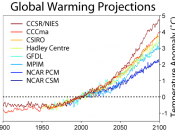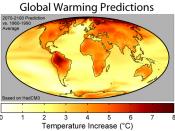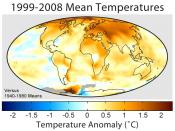Global Warming Controversy
The global warming controversy is a long-running dispute about human effects - past, present and future - on climate. The starting point is whether there has been significant global warming caused by industrial emissions of carbon dioxide. But this alone would be a scientific argument confined to the scientific press. The point that leads to major controversy - because it could have significant economic impacts - is whether action (usually, restrictions on the use of fossil fuels to reduce CO2 emmissions) should be taken now or in the near future.
The science of global warming is spread over several articles:
The basic science is covered in greenhouse effect
Recent climate trends include: global warming, global cooling
Past climate behavior, being studied in determining normal variation as well as recent climate: historical temperature record, temperature record of the past 1000 years, satellite temperature record
Causes of recent climate trends: attribution of recent climate change
Supporters' position
Supporters of the global warming theory assert that:
the IPCC reports correctly summarise the state of climate science
the historical temperature record shows a rise of 0.4-0.8
ðC over the last 100 years
this rise is unprecedented in the temperature record of the past 1000 years
climate models can reproduce this trend, but only when using greenhouse gas forcing [1] (http://www.cgd.ucar.edu/cas/GLOB_CHANGE/ipcc2001_figs/fig3.gif)
attribution of recent climate change shows that the rise can be attributed to human emissions of greenhouse gases
climate models predict more warming, and other climate effects (sea level rise, etc) in the future
there is a scientific consensus behind all of the above
humankind is performing a great geophysical experiment and if it turns out badly - however that is defined - we cannot undo it.
"Proponents" of global warming tend to support the IPCC position and thus represent a...


